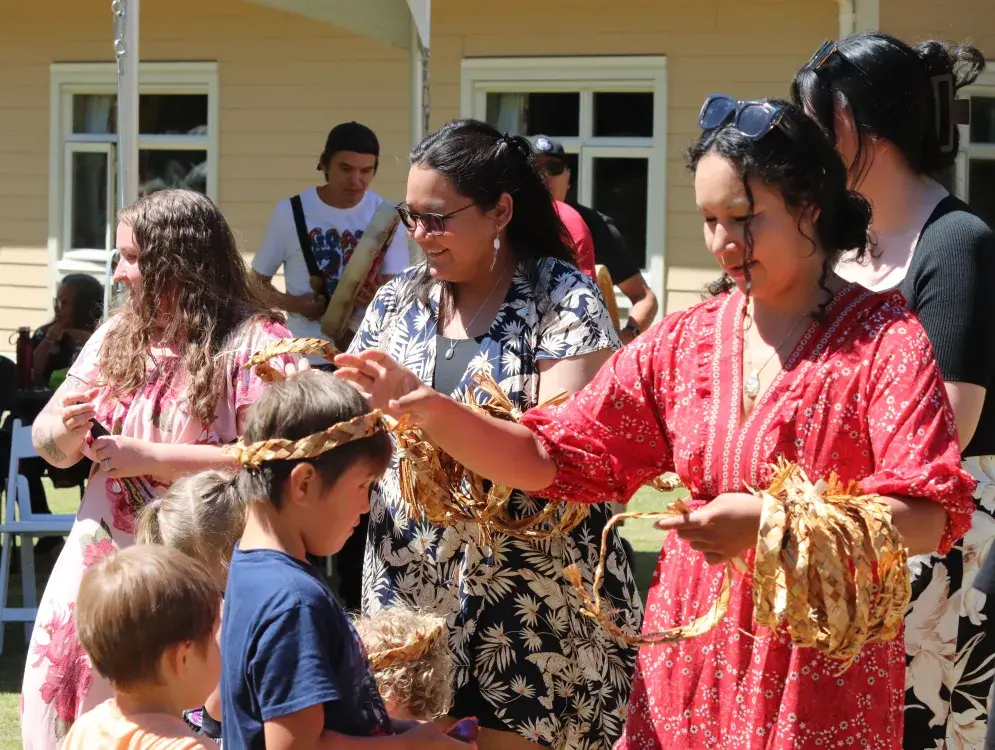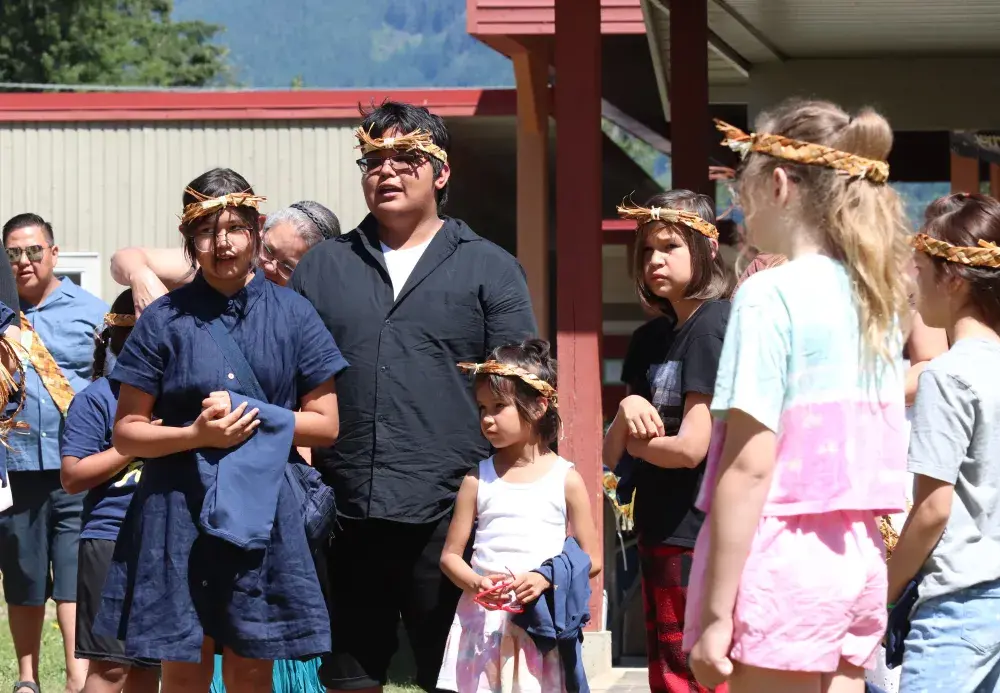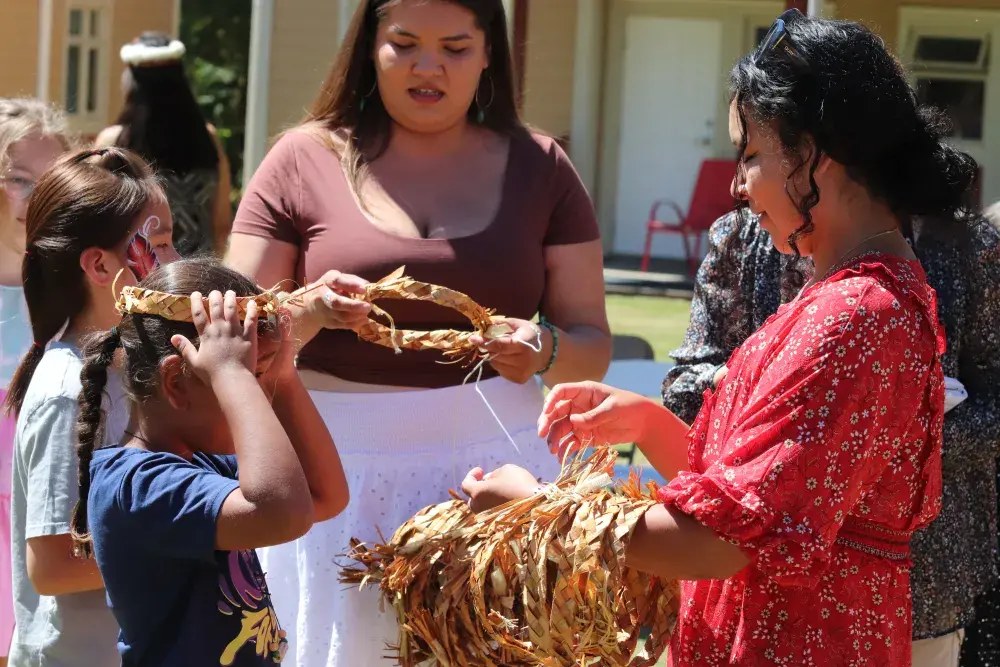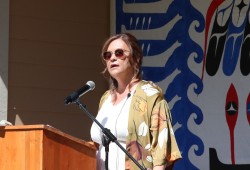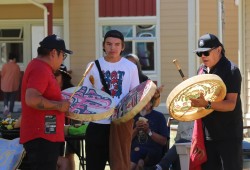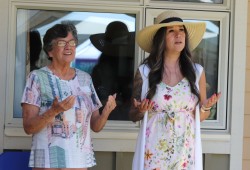The sun was shining, bringing with it an extraordinary heat, as community gathered in the shade of tents next to Kackaamin’s playground to celebrate the 50th anniversary of the Indigenous family treatment centre on July 5.
As Executive director Lisa Robinson and her team were preparing for the 50th anniversary celebration, she reflected on the elders that have been involved with Kackaamin through the years.
“It's them, it's their vision and their love that they gave us to continue on and carry on,” said Robinson. “We're following in their footsteps [of] what they laid out for us, to heal.”
Robinson named the late Mary Hayes, Ray Seitcher, and Eileen Charleson among those who first paved the way for the Indigenous treatment centre.
“They had to break through some really hard things in the beginning, even residential school wasn't spoken about at that point,” Robinson reflected. “But they were speaking out and saying, ‘We need to heal.”
For Robinson, these pioneers taught how to be relational and attune to others.
“It's that relational piece,” said Robinson, noting the significance of “attuning to somebody’s spirit” and “feeling them where they’re at.”
“That's the healing part; that's what was passed on,” she said.
“What I've uncovered is, all of that trauma that isolates us and disconnects us from our loved ones, so we got to repair that, [and] that's what we're doing,” said Robinson. “So that we can just naturally come back together as we always were.”
Kackaamin is one of three Indigenous family treatment centres in Canada, located in Port Alberni, B.C. Among their many programs and services, the centre has a six-week healing program that focuses on rebuilding family attachment.
“It's important to include children, because the whole family system is affected when you have addiction present,” said Robinson, who notes now they include members beyond the nuclear family structure. “Not only addiction, it's trauma. If you're struggling with mental health and depression, trauma history of residential schooling - even if you’re not drinking, your pain is there.”
Robinson recalls memories that Elsie Robinson had shared with her about living in a longhouse.
“That wasn't that long ago that they lived in our way, where she lived with lots of families, [and] they all took care of each other,” said Robinson. “There was kindness and love and protection.”
Robinson thinks this sentiment is the base for Kackaamin.
But, “it’s not as simple as it sounds,” she shared.
“[There’s] lots of pain people are carrying inside and because of that disconnect, they can’t even express it because they’re disconnected from people,” she noted, stressing the need to build bridges with people so they can get the help they need.
Robinson shared that due to the intergenerational impacts of residential school, oftentimes clients that come to Kackaamin experience feelings of emptiness and haven’t learned about emotional health.
“We do the hard work of what gets in the way; that's what we focus on,” she said. “Some of the things we've uncovered are very painful.”
Anges Keitlah has gone through various programs with Kackaamin. She was beaming as she spoke with Ha-Shilth-Sa at the 50th celebration.
“I think it’s really amazing, [Kackaamin has] come this far,” she shared.
Prior to participating in Kackaamin’s programs, Keitlah struggled greatly.
“I was a real wreck,” she said. “I didn't want to be here; I didn't want to be anywhere.”
But Keitlah found Kackaamin’s programs to be a “stepping stone to the positive” that saved her life.
“It doesn’t just take one program for you to function, it takes a lot,” she shared. “It took a lot of work for me to get to where I am today.”
After doing programs with Kackaamin, Keitlah was able to be a more positive influence in her children and grandchildren’s lives.
“If you have it in your heart to work on yourself, to want the goodness, it really works,” said Keitlah. “You have to go through that door that's been holding you back and it's very painful because you don't want to step over that door because that’s… all you know.”
“It's very hard to let some of that go too, because that's how you survive; you hold on to that abuse and what society put on you,” she continued. “You hold on to it because that's all you have. You don't know there's goodness over there, you don't know that somebody's going to say, ‘Oh, wow, you did great’.”
Gord Johns, MP for Courtenay-Alberni, was present at the 50th anniversary. He told the crowd that Kackaamin’s success over the years has paved the way for the opening of Vancouver Islands first Indigenous youth wellness centre, offering culturally relevant detox services to youth through an organization called Orca Lelum.
“It is leading the legacy of healing,” said Johns as he took to the podium to speak. “[The government] need[s] to do more to support Kackaamin, to build more facilities like Kackaamin, because this model needs to be replicated right across this country and it needs to be done quickly.”
Over the last six years, services and programs that Kackaamin provides have tripled, Robinson shared. Kackaamin now has 10 beds for support and early recovery for females on site.
“They need that safe space to start recovering, so it’s very light,” she said. “They’ll do programming, but it's just more about getting them feeling stable, eating well, sleeping well, [and] feeling safe.”
Over the last year they have included other additional programs such as Rebuilding Our Circle, which includes services for those who have been impacted by sexual violence.
“Now we're offering programs for those who have been harmed, those who harm, and family systems that are connected to that,” said Robinson to the crowd gathered next to Kackaamin’s playground.
With the expansion in services came two new buildings, including a new gathering space as well as a childcare facility that can accommodate up to 24 children.
“I'd like to congratulate Kackaamin on your 50th anniversary, [a] significant milestone, and just want to honor and acknowledge the courage, the dedication, and the leadership of all those who were instrumental in establishing this organization for children, families and communities,” said Eunice Joe, regional executive director for First Nation Health Authority, a sponsor for Kackaamin. “The impact of the work over the years is far reaching.”

